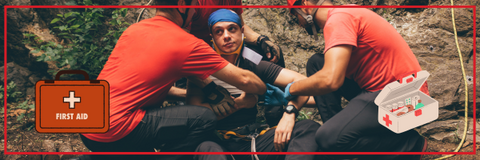
The Golden Hour: Understanding Rapid Bleeding Control
Share
The Golden Hour is an important concept in emergency medicine. It refers to the first 60 minutes after someone experiences a traumatic injury, during which time their chance of survival is highest. The Golden Hour is also known as the "Window of Opportunity" or "Time Critical Period." Understanding this critical time frame can help first responders, EMS personnel, and citizens of all stripes save lives when seconds count.
What is the Golden Hour?
The golden hour is the first hour after an injury. It's a concept that has been around for decades and refers to the idea that the rate of survival for trauma patients drops significantly after the first hour. The term "golden" was used because this time period represents optimal conditions for rapid bleeding control, during which blood loss can be minimized or stopped altogether if treatment is provided quickly enough.
The exact length of a "golden hour" varies from person to person depending on their type of injury and other factors such as age, overall health, etc., but most people experience an increase in mortality rates after 60 minutes have passed since sustaining their injury (1).
How long does the Golden Hour last?
The Golden Hour is a term that refers to the first hour after a traumatic injury. It's not a fixed time period and can vary depending on the type of injury and location of the injury. For example, an intact limb with an open fracture would have more time than a severed arm because it takes longer for blood flow to stop in those situations.
The Golden Hour is also known as the "shock window" because during this time period there are many things happening in your body that put you at risk for death if not treated immediately:
- Bleeding continues at full force until clotting begins; if you don't stop bleeding within 60 minutes after an injury, then you're likely going to bleed out!
- Your heart rate increases significantly which places stress on vital organs like kidneys (they can fail within 24 hours without proper treatment). If they fail during this time period then death becomes imminent even if other injuries are managed properly because without kidneys there won't be enough oxygen being transferred around our bodies through red blood cells alone anymore either due to shock or loss thereof...and since our bodies need oxygen above all else we will eventually pass away due to lack thereof regardless whether we've been shot multiple times or stabbed only once."
Why is rapid bleeding control important?
Rapid bleeding control is a crucial part of first aid. In fact, it's one of the most important things you can do to help someone who has been injured or suffered from an accident. If you don't stop the bleeding quickly, it could lead to serious health issues such as infection, shock, and further injury. The golden hour refers to the first hour after an injury occurs during which time rapid bleeding control becomes most effective at saving lives.
- Bandages: Bandages are used for light wounds such as scratches or cuts where there isn't much blood loss occurring yet but still needs protection from dirt/dust etc.. You can make your own bandages out of items like gauze pads (disposable), clean clothes (such as old t-shirts), cotton balls, etc.. These items should be washed thoroughly before using them though because they may contain bacteria!
- Towels: Towels are best suited for heavier wounds where there is more blood loss happening within minutes after sustaining an injury - especially if those wounds involve major arteries like wrists/forearms etc.. To apply pressure onto these types of injuries using towels effectively enough so they don't reopen themselves when applied pressure stops being applied requires heavy pressure over long periods which might be difficult depending on how strong each person's grip strength is so having multiple people hold down said towel would probably work better than just one person doing so alone."
What you can do to help?
- Call 911. If you're trained to do so, help the victim by applying pressure to the wound and keeping them calm until medical personnel arrive. If not, wait for instructions from emergency responders or other first responders (e.g., police).
- Do not move the victim unless they are in danger of further injury--in which case, move them only as much as necessary--and don't try to clean or bandage their wounds; this can make things worse by disrupting clotting and increasing bleeding rates even more than they already are after a traumatic injury like falling off of a ladder onto concrete!
- Don't give food or water; instead offer comfort measures such as stroking their hand or talking softly into their ear while waiting for help
Important concept for first responders
It's the first hour after injury, which is when you have the best chance of survival. During this time, you need to control bleeding and prevent hypothermia by keeping the injured person warm with blankets or other materials (such as clothing). If you know first aid, you can keep someone alive until help arrives.
The length of the Golden Hour can vary depending on what type of injury it is; however, there are things that can be done during this critical period:
Conclusion
The Golden Hour is an important concept for first responders to understand and for citizens to understand as well. The sooner you can get help after a traumatic injury, the better chance of survival. Knowing what to do in an emergency situation could save someone's life.

